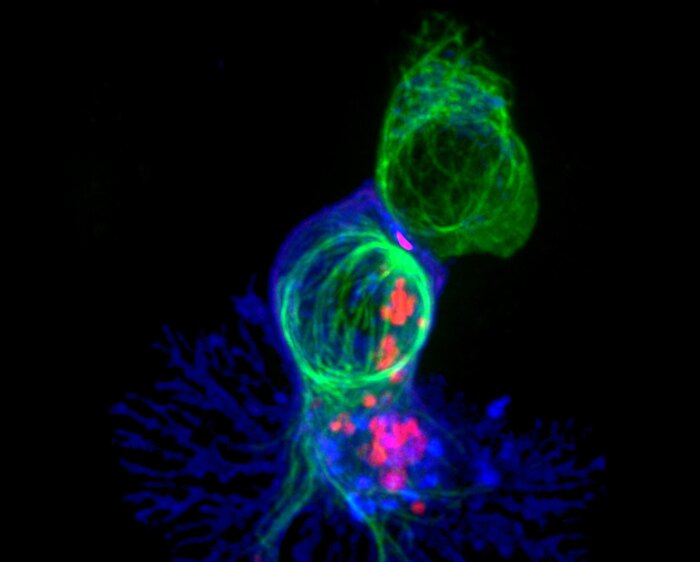Hundreds of young Chinese lost their fear and spoke loud and clear on the streets of the country's main cities last weekend.
"We want freedom, we want our lives back," they chanted.
Something as simple as going to the movies, going out to dinner at a restaurant or taking a weekend getaway has been complicated in many parts of the Asian giant —and practically impossible in others— since the outbreak of the pandemic.
And it has been made especially uphill since the appearance of the omicron variant at the beginning of this year, which caused the authorities to assume an even firmer stance when it comes to applying their zero covid policy.
Faced with the protests that have shaken the country in recent days opposing the strict anti-pandemic measures, Beijing seems to be clear about its plan: head off the demonstrations with the deployment of a tough police device and accelerate the vaccination of the elderly, whose rates of immunity are still too low.
Hundreds of people were able to gather on Saturday and Sunday in different parts of China to show their rejection of the zero covid policy – which consists of the isolation of all those infected, massive campaigns of PCR tests, confinements and strict border controls.
But on Monday the government already showed that it was not going to tolerate the spread of the protests.
The authorities torpedoed the organization of new meetings by fencing off the areas where the protesters had gathered the previous day and deploying the forces of order to invite all those with an attitude of meeting to leave the place.
The demands of the agents have reached the point of claiming mobile phones from passers-by and even from passengers on the Shanghai subway,
At a time when China is registering record numbers of infections, the National Health Commission has promised this Tuesday to "accelerate vaccination of the elderly over 80 years of age, and to continue increasing the vaccination rate of people from 60 to 79 years".
Despite being the most vulnerable group to contract covid-19, the Chinese elderly have been the most reluctant to inoculate themselves.
Of the 35.8 million people over the age of 80 (according to the latest census, in 2020), only 65.7% have received the full vaccine schedule and 40% the booster dose, according to data provided by the Council of State on November 11 at a press conference in which 20 measures were announced "to optimize the prevention and control of the epidemic."
Unlike in other parts of the world, the coronavirus vaccination campaign did not start with the elderly.
In China —except for when the first cases were detected in Wuhan— there has not been a feeling of really being exposed to the virus until 2022. The low levels of infections and deaths in the first two years of the pandemic —even the current figures are tiny when compared to those of other countries— helped to avoid generating a sense of urgency to receive the injection.
During the spring wave, some local governments resorted to offering discount coupons, gifts and even cash to try to convince the elderly to get vaccinated.
This Tuesday, the National Health Commission announced a working group to "strengthen" the vaccination of that group.
The plan seems to be limited to "educating on the importance and benefits of being inoculated" and reducing the time to get the booster dose, which will become three months after completing the regimen.
Already with the protests silenced, China seems to be sending signals of a possible relaxation of the measures, although these have been taken with skepticism by some users of Weibo, the largest microblogging social network in the country.
The
Beijing News,
affiliated with the Communist Party, has published an extensive report on Tuesday in which people who have had the covid express that everything is fine after the disease.
For his part, the controversial Hu Xijin, former editor-in-chief of the Chinese nationalist newspaper
Global Times,
He wrote on his Twitter account: “The new omicron variant is spreading rapidly and is forcing adjustments to the anticovid response in many parts of China.
The rate of serious cases due to covid is 0.25%.
Most Chinese are not afraid of getting it.
China may come out of the shadow of covid-19 sooner than expected.
The new Omicron variant is spreading fast, pushing adjustment in COVID response in many parts of China. China's current rate of severe cases is about 0. 025%. Most Chinese people are no longer afraid of being infected. China may walk out of the shadow of COVID-19 sooner than expected
— Hu Xijin 胡锡进 (@HuXijin_GT) November 28, 2022
Perhaps as a nod to the protests, health officials have assured that the strong restrictions have left "complaints for being excessive" and have reiterated that "all localities must strictly apply national regulations."
Despite the aforementioned readjustments to the protocols that were published on the 11th, local governments have continued to take the law into their own hands when it comes to imposing lockdowns, for fear that excessive flexibility would cause an even greater increase and a faster rate of the contagions.
When asked if the government is really considering a change in strategy, Mi Feng, spokesperson for the National Health Commission, assured: "We are constantly adjusting the measures against covid."
He acknowledged that the lockdowns "have affected the normal life" of people and their mental health, as well as the economy.
"The prevention measures have not been precise and the information has not been sufficient and timely, which has caused misunderstandings," said the spokesman, according to the Efe agency.
Alicia García Herrero, chief economist at Natixis, believes that the protests are not going to spread and that everything indicates that China will follow a model similar to that of Hong Kong, with "express lockdowns."
"I think that in this way they will reduce the pressure a bit, but the key is to accelerate vaccination very quickly, because in Hong Kong there are still many cases and the health system has collapsed," she continues.
Regarding the economy, García Herrero maintains the GDP growth forecast of 4.3% for next year.
"I think that, although there are comings and goings with openings and confinements, the authorities are going to bet on vaccination to avoid a scenario in which the protests continue," she concludes.
Follow all the international information on
and
, or in
our weekly newsletter
.
Subscribe to continue reading
Read without limits
Keep reading
I'm already a subscriber









